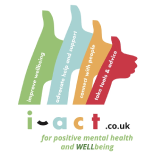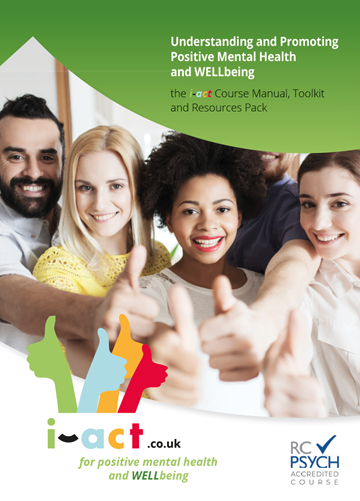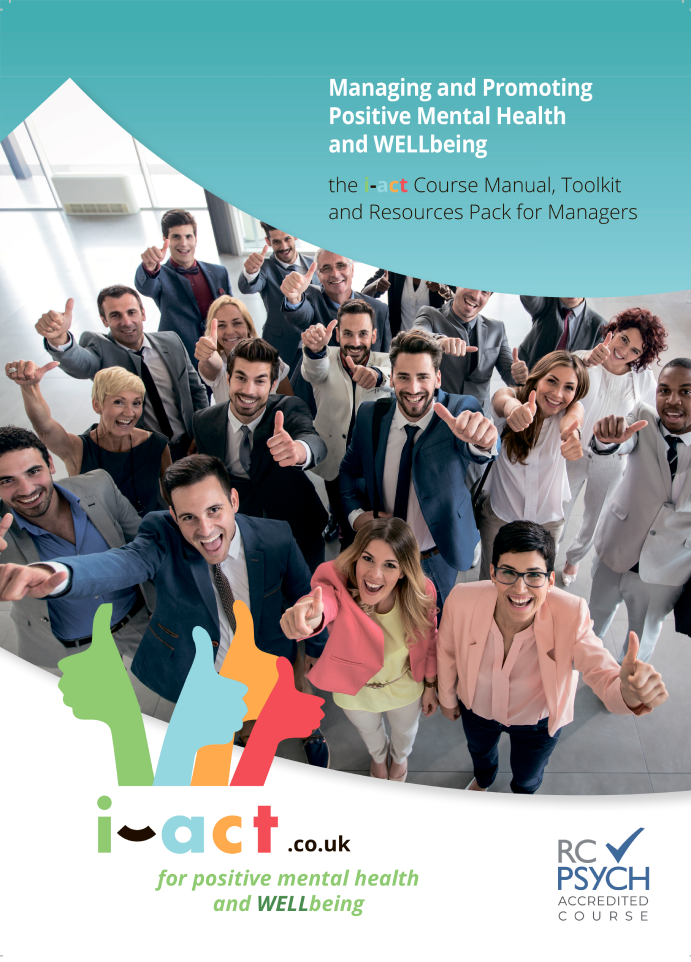
The i‑act model and tools
The i‑act model maintains a focus on common mental health issues, such as anxiety and depression, and also addresses how we might improve wellbeing in order to build resilience. The i‑act model gives practical guidance and tools for how we might improve our own mental health and wellbeing and support others who may have a mental health or wellbeing issue. It informs participants as to what they need to know and offers tools for addressing and improving mental health and wellbeing in the workplace.
About i‑act
The evidence-based i‑act for positive mental health and WELLbeing model and tools were first developed in 2016 and have since been adopted by many organisations across the UK. The i‑act model and tool have been designed by leading chartered psychologists and mental health professionals in the field; they are evidence-based courses which have been independently accredited by The Royal College of Psychiatrists. i‑act is systematically reviewed every 3 years and can be delivered anywhere in the UK and around the world.
As you can see, each letter of i‑act refers to a different part of the plan.
i Improve wellbeing
a Advocate and access help and support
c Connect and communicate
t Take tools and advice

i‑act Principles
- i‑act is an evidence-based approach which is designed by leading chartered psychologists and academics in the field, and is systematically reviewed every three years. Registration as an i‑act manager/practitioner is valid for three years.
- i‑act aims to reduce the stigma around mental health and wellbeing issues, and promote more positive messages.
- i‑act offers a basic first-response approach along with a proactive focus upon improving wellbeing to help build resilience.
- i‑act practitioners and managers may identify signs of distress, but don’t diagnose.
- As the lay person, it’s not our role to ‘treat’ someone’s mental health or wellbeing issues.
- i‑act practitioners and managers may offer support and signposting, but know their limitations
- i‑act practitioners and managers ensure their own safety first. Don’t put yourself at risk either physically or regarding your own mental health and wellbeing.
- Only use the i‑act tools and techniques when you feel comfortable and confident to do so; however, don’t walk on by, if you’re unsure seek additional help and support.
- Think about your own mental health and wellbeing, any support you might access and how you might actively improve your own wellbeing.
- Don’t be alone – if you are unsure, just ask, seek professional help and support. The i‑act course manual, toolkit and resource pack details over 95 agencies and organisations who are there to support you.
- i‑act supports the theory that actively improving our wellbeing can help to build our resilience.
i‑act Courses
Download the information leaflets (below) to find out more about our accredited i‑act courses

Understanding and promoting Positive mental Health and WELLbeing
With 156 pages of evidence-based research, over 45 tools and over 95 agencies/organisations to refer on to - i-act the course manual, toolkit and resource pack (right) is ESSENTIAL for ALL employees and for frontline workers

Managing and promoting Positive mental Health and WELLbeing
With 168 pages of evidence-based research, over 50 tools and over 95 agencies/organisations to refer on to - i-act the course manual, toolkit and resource pack (left) is ESSENTIAL for ALL managers.